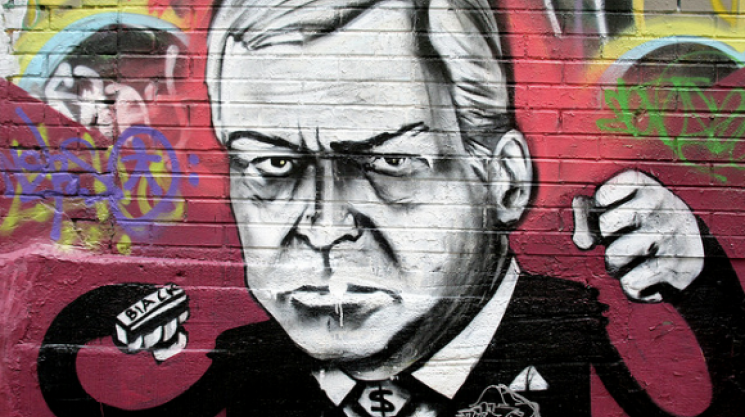
Mon, 05/14/2012 - 00:23 by Douglas Haddow
So here we are in Ottawa, in the Year of Our Lord, Two-Thousand and Twelve and already deep into the new politics of immigration, a course set and championed by the Conservative government, and more specifically by immigration minister Jason Kenney, the Harper-in-waiting. And in comes Conrad Black, the spurned Canadian newspaper baron – a sort of Dickensian hangover icon of late 19th Century nostalgia, right down to his exile back to the Old Country at the hands of a chastened prime minister.
The news of Black’s imminent return to Canada flowered on Twitter a few minutes into question period on that first day of the month. It only took a few more for it to come up in on the floor of the House of Commons, via the man who’d only months before had his own citizenship publicly noted. Thomas Mulcair – the Frenchman, as we learned not so long ago – stood then, at 2:48 pm.
If Black was back, what about everyone else, he asked. What about Gary Freeman, the 1960s activist, jailed for a time in the U.S. and subsequently denied entry to Canada for 40 years? Why, Mulcair asked of the government was there an apparent double standard? “Matters such as this are a matter of personal privacy. I cannot comment on specific cases without a privacy waiver,” Kenney said, immediately before adding some comment on the specific case at hand.
“Having said that, I can advise in respect to this individual that I indicated to my department that I would not have any involvement in an application from that individual, and that his application would be treated by highly trained independent members of our public service.”
Call it the politics of nationalism. Actually, forget that. It should be cleaner – something for the heartland sponge soaking up the latest installment of imported television. The politics of belonging. Best served, for those wondering, in small doses that cumulatively reaffirm all the greatest hits of Canadiana: hockey, snow, that time we burnt down some American shit.
It’s all there for the lucky few. It’s a funny thing, this Canadian identity, this designation written in big secure letters on page 2 of that little blue passport in both official languages, and how much political capital it can produce when needed. Are you the kind of Canadian who never leaves apart from a short visit to the U.S. every now and then, or are you the kind that disappears for a while and returns? Are you new or old? Are you here for good or just visiting? And how many votes does either one win you?
Of course Black doesn’t have one of those little blue books. He gave all that up. He doesn’t have that particular bold typeface designation anymore. His book is crimson red and a little stiffer, with his name written on a hard plastic page at the back somewhere north of the words British Citizen. Does that make the questions about his devotion to the country all the more important, or just more obvious?
They all seem like valid, even perhaps pressing ones, these musings about nationalism and identity, until you realize nobody asking them actually cares about the answer.
It’s not about whether Black is a Canadian or not. It’s much simpler than that. It’s about whether Black is a Conservative. Whether you’re a Canadian or not isn’t as important in this town as whether you’re striking your penciled checkmark next to blue, orange, or red. Just ask Michael Ignatieff.
You’re new here? You’re old hat? You’re coming back? That’s nice, but nobody really cares. Tell us who you’re voting for.
A week out from his return, Black – likely already quite comfortable back at his Bridle Path mansion – was already old news. But Ottawa furrowed over him still. In the Hill Times, former Liberal cabinet minister and failed party president candidate, Sheila Copps, echoed Mulcair’s concerns.
“In a government where every single press release requires a prime ministerial sign-off, there is no way that Black’s case was decided in the bowels of the bureaucracy. Fess up!” she cried. “At least when the previous Liberal government denied him the right to ascend to the British House of Lords while retaining his Canadian citizenship, we openly admitted that cabinet made the decision.”
See what I mean?





Add comment